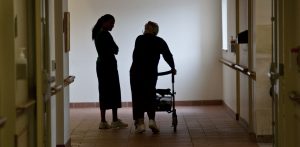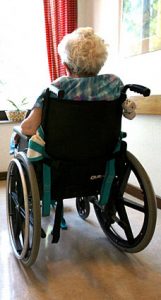JUSTICE FOR VICTIMS OF NURSING HOME ABUSE AND NEGLECT
CRISIS IN ELDER CARE NURSING HOME NEGLECT AND ABUSE
According to the National Center for Adult Abuse between one and two million elderly Americans have been mistreated, injured or exploited in some way while being cared for by someone entrusted to care for them. The crisis of inadequate care is on the rise as our population ages. There are federal and state laws to protect the safety, rights and quality of life for all nursing home residents.
The decision to place an elderly loved one in a nursing home or assisted living facility can be a difficult one. The decision to place a parent or grandparent is accompanied with uncertainties and worries about the quality of care your loved one will receive in the facility. Our elderly deserve respect and dignity as they age. Our elderly do not deserve to be humiliated, neglected and degraded in long-term care facilities and assisted living facilities. Many victims cannot speak for themselves so it is important for family members and friends to be the victim’s voice.
Lawsuits against nursing homes empower residents and family members by holding owners, administrators and direct-care workers accountable, that substandard care can never go unnoticed and tolerated. If a loved one has been injured or killed in a nursing home, take action as quickly as possible to protect your loved one’s rights. Lawsuits have time limits, so it is crucial to speak to an attorney as soon as the neglect or abuse is suspected.
COMMON TYPES OF NURSING HOME ABUSE AND NEGLECT
PRESSURE SORES
Pressure sores (also known as bedsores, pressure ulcers or decubitus ulcers) are lesions on the skin that typically form due to constant pressure on bony parts of the body. The pressure decreases the blood flow to these areas, causing the tissue to die. Bedsores can occur anywhere on the body, but are commonly found on body parts:
- Tailbone
- Ankles
- Elbows
- Heels
- Sacrum
Pressure ulcers can and should be prevented. Nursing homes are obligated to assess each resident to determine if they are at risk for bedsores. When a resident is at risk for pressure sores nursing home staff must develop a care plan to prevent sores from forming or worsening.
Nursing home residents at certain stages of incapacity are at risk for developing pressures sores. There are numerous risk factors. Some of the most common include:
- Poor Nutrition and Hydration
- Immobility
- Peripheral Vascular Disease
- Diabetes
All long-term care facilities are required to have procedures in place to prevent the development or worsening of bedsores.
NURSING HOME FALLS

Thousands of residents die each year due to falls in nursing homes, according to the Centers for Disease Control and Prevention. Those who survive often suffer debilitating injuries which they never fully recover. Nursing homes falls are common because residents are typically older, have difficulty walking due to muscle and bone density loss, medication side effects, poor vision and gait problems. Nursing home falls are often preventable if nursing home employees take the proper steps to supervise and protect residents under their care.
Nursing home staff play an important role in protecting the safety of residents. When patients are admitted into a nursing home, staff must assess their risks for falls, identify and implement interventions to address the risks. Residents should be monitored closely and receive assistance with transfers to prevent them from falling. Wheelchairs with wheels locked, lift/comfort chairs, bed rails, nonskid footwear, walkers and canes can be used to help prevent falls.
Injuries from falls in nursing homes can result in further medical issues and permanent disability. For older people, these injuries can reduce their quality of life and cause their medical condition to deteriorate rapidly. Although some falls are unavoidable, falls in nursing homes are often a sign of negligence and understaffing.
MEDICATION ERRORS
 Medication errors are frequent and serious problems in nursing homes. Residents are often given the wrong medication or not given the medication in the dosage or frequency required by the physician. These problems occur as a result of carelessness by the staff, lack of supervision of the nurses administering medications or not having the proper trained and supervised staff to administer medications.
Medication errors are frequent and serious problems in nursing homes. Residents are often given the wrong medication or not given the medication in the dosage or frequency required by the physician. These problems occur as a result of carelessness by the staff, lack of supervision of the nurses administering medications or not having the proper trained and supervised staff to administer medications.
Delayed or missed doses of medication, administration of the wrong dose or the wrong medication are the two most common medical mistakes made. Medication errors are significant in that most patients are required to take a certain number of prescriptions and already have compromised physical or mental health conditions.
Overmedication often happens in nursing homes when they are understaffed. Employees may overmedicate residents to sedate, manage or control them. Signs of over medication:
- Confusion
- Oversleeping
- Personality Changes
- Lethargic
- Withdrawn or Reclusive Behavior
Antipsychotic drugs are often prescribed to treat younger residents who suffer from mental illness. When nursing homes administer antipsychotics to elderly residents who suffer from dementia this causes lethargy and can lead to other serious medical issues.
MALNUTRITION AND DEHYDRATION
Nutrition and hydration are important in the care of residents. Residents’ diets are at risk for developing pressure ulcers, infection, muscle weakness leading to immobility and falls.
There are a variety of factors that can lead to malnutrition. Individuals suffering from depression have a tendency to eat less and do not receive adequate vitamins and minerals to prevent malnutrition.
Other causes of malnutrition include difficulty swallowing and adverse drug effects such as diarrhea and vomiting. Nursing homes often fail to prevent malnutrition by not monitoring resident food intake, promoting a comfortable environment for eating and food that is appetizing.
Choking can be a problem in nursing homes when residents have medical problems or take medications that make it difficult to chew or swallow. These residents are at high risk and require special food preparation or diets to ensure proper nutrition. Residents at risk should be closely monitored during mealtimes.
Choking by depriving oxygen to the brain can cause brain damage and even death. This injury may appear accidental, but in some instances choking is a result of nursing home negligence. This could result from giving residents the wrong foods or monitoring them when they are eating. Nursing homes should be held accountable for their fatal mistakes.
PHYSICAL OR SEXUAL ABUSE
 Nursing home resident are easy targets of Physical or Sexual Abuse because of their dependence on others. Many residents cannot communicate and report the abuse themselves. Physical abuse involves both sexual assault and any form of physical assault or maltreatment.
Nursing home resident are easy targets of Physical or Sexual Abuse because of their dependence on others. Many residents cannot communicate and report the abuse themselves. Physical abuse involves both sexual assault and any form of physical assault or maltreatment.
A resident may not be able to speak for themselves but their physical condition can reveal warning signs of nursing home abuse. Signs of physical and sexual abuse include:
- Bruises
- Cuts
- Burns
- Broken Bones
- Withdrawn
- Unexplained Bleeding
- Dirty or Torn Clothing
- Hair Loss
- Unexplained Crying and/or Anger
- Violence
- Erratic Moods
- Fear
Abuse may occur between two residents or between a nursing home staff member and resident. Doesn’t matter who the abuser is, nursing homes are responsible for protecting the safety and well-being of residents under their care.
WANDERING AND DERSERTION
 Wandering is when a resident aimlessly moves throughout the facility where the resident puts his or her safety at risk due to an inability to know danger. Desertion is a resident’s ability to leave the nursing home unsupervised and unnoticed.
Wandering is when a resident aimlessly moves throughout the facility where the resident puts his or her safety at risk due to an inability to know danger. Desertion is a resident’s ability to leave the nursing home unsupervised and unnoticed.
Wandering and desertion are risks the nursing home staff must recognize and plan to prevent residents from leaving the facility or entering into an unsafe area. Nursing home staff must provide each resident with appropriate levels of supervision to prevent these behaviors. Exit doors should be alarmed to notify staff when residents leave the facility unsupervised. Failure to prevent desertion puts residents at risk for falling, exposure to harsh weather and other dangers.
When someone you care about has been the victim of nursing home negligence or abuse, the problems may seem overwhelming. Ballard Law Firm can advise you of your loved one’s legal rights, explain the remedies that might be available, and what steps to take.
To reach out and schedule a free initial consultation to discuss a personal or work injury call James Ballard at 515-221-2521 or Contact Us.
